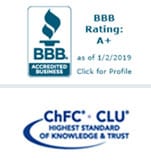
Thus far 2020 has been a year filled with uncertainty, with one exception, the choice on whether or not to take a 2020 RMD disbursement. Due to both the SECURE and CARES Act, a multitude of options are available for those of age to receive RMDs. The choice is whether or not to take one in 2020.
RMD Defined
An RMD is a Required Minimum Distribution which is a forced withdrawal from any qualified retirement account that has never been previously taxed, such as IRA’s, 401K’s, 403B’s, or SEP-IRA. New legislation passed under the SECURE Act in December 2019, changed the age of RMD withdrawals from 70 ½ to 72. If you had turned 70 ½ prior to the SECURE Act in December 2019 then you were required to take your 2019 RMD by April 1, 2020. Now, due to the CARES Act, if you withdrew your 2019 RMD in 2020 and no longer need the money the disbursement can be returned. In addition, you can take advantage of the 2020 RMD waiver and not take the 2nd RMD for 2020. This means both RMDs for 2019 and 2020 could be deferred until 2021.
The CARES Act and How It Affects Qualified Retirement Accounts
The Coronavirus Aid, Relief, and Economic Security (CARES) Act was signed into law on March 27, 2020. As part of its provisions, the law stipulates that for 2020, people with IRAs or other retirement accounts, like 401(k)-type plans, have a choice whether or not to take their 2020 RMD. In addition, for those who have qualified retirement accounts and passed away prior to the RMD age, the beneficiaries are allowed a minimum of 5 years to withdraw all assets and close the account; Year 2020 is not counted and so the first of 5 payouts would begin in 2021.
Reasons You May Want to Take a 2020 RMD
You need your RMD as income to offset expenses.
You may have a higher tax bracket in the future, and you may wish to take all or part of your distribution now. Doing so can help you save money over time.
You want to make a qualified charitable distribution (QCD), where the money is paid directly from your IRA to a qualified charity. This can help reduce your gross income and taxes. To ensure you follow the rules for a QCD, it’s best to work with a financial advisor
Reasons You May Not Want to Take a 2020 RMD
You want to reduce your taxable income. If you don’t need the money, deferring your RMD reduces your 2020 taxable income. Two things to be aware of are for those who turned 70 ½ before December 2019, and would have had to initially take two RMD’s in 2020 – one for 2019 by April 1, 2020, and a second for 2020 – you will now be responsible for taking two disbursements in 2021. There is potential that your account value may have increased due to two years of deferred RMDs, this may impact your taxable income and raise your Medicare premiums. It’s more complicated than you think and it’s best to speak with a tax advisor.
You want your funds to potentially recover when the market improves. Many people do not like having to take an RMD when the market is down. Having the choice to defer your RMD gives your assets an opportunity to recover.
Remember if you choose not to take your 2020 RMD, you must reactivate it for 2021 to avoid the 50% excise tax on the amount not distributed as required.
What to Do If You Have Already Taken Your 2020 RMD?
With 2020 half-finished, some folks may have already received a 2020 RMD. If that be you, what are your options?
Keep your RMD, and use it for upcoming expenses, rent an RV, visit the grandchildren or save it.
Return gross amount of RMD, Whoever withdrew a 2020 RMD is permitted to reverse this action, if done by August 31, 2020. IRS Notice 2020-51 applies to withdrawals made January 1, 2020, through the August 31 deadline. The ability to re-deposit RMDs also applies to inherited IRAs. IRS Notice 2020-51 also permits roll over or re-contributions of RMDs to multiple IRA accounts. Previously, account owners were only able to rollover or re-contribute to one IRA account in a rolling 12-month period. The provision to re-contribute to multiple accounts has also been extended until August 31, 2020.
The RMD waiver does not apply to defined benefit plans–for example a pension plan. If you are required to take distributions from such a plan, then you will still have to do so.
Tax, Insurance, and Retirement Planning Experts
This historic year has created multiple new regulations regarding taxes, investments, and retirement income, for those entering or currently in retirement. Now is the time to review your retirement and estate plan – trusts, investments, and ROTH conversion opportunities – because making sure you have enough income, enjoying your retirement, and leaving a legacy to your family all keep #retirementsimplified.
Schedule your no-cost, no-obligation appointment with an expert, trusted fiduciary at Cowen Tax Advisory Group. Give us a call today at 860-676-1100 or email us at cowentaxgroup@gmail.com




